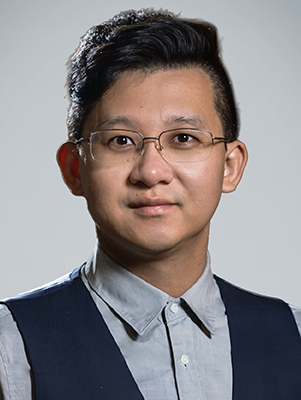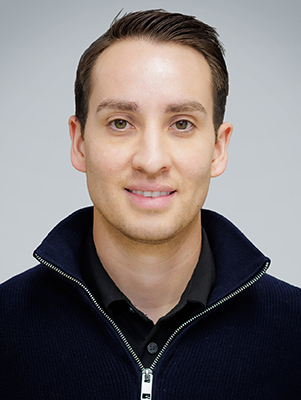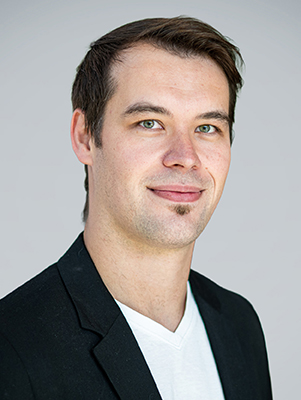PDA Executive Board and Representatives
All SOT Postdoctoral members are part of the Society’s Postdoctoral Assembly (PDA), which is governed by the elected PDA Executive Board. Postdoctoral representatives are appointed to SOT Regional Chapters, Special Interest Groups, Specialty Sections, and some SOT Committees to enhance the involvement of postdoctoral scholars within SOT.
PDA Executive Board


Esther Omaiye
Chair
Dr. Omaiye is a Postdoctoral Fellow in the Molecular, Cell & Systems Biology department at the University of California, Riverside. She received her MS in Biotechnology and Bioinformatics from the California State University Channel Islands and her PhD in Environmental Toxicology from the University of California, Riverside. Her research investigates emerging tobacco products and their potential effects on human health using analytical and in vitro approaches. She is an author/co-author of several peer-reviewed articles. She has presented her research at numerous meetings/conferences and served as moderator on panels and symposia. Dr. Omaiye has been a member of SOT since 2017 and served her regional chapter as a Graduate Student and Postdoctoral Representative, during which she also served the Graduate Student Leadership Committee as a Member and Secretary and chaired the Programming and Professional Development Committees. She was a peer mentor for the Undergraduate Education Program and has volunteered for the Undergraduate Diversity Program and Continuing Education Programs at SOT Annual Meetings. She has organized local ToxScholar events and continues to promote SOT and encourage undergraduate interest in toxicology. As a dedicated and serving SOT member, she has acquired immense knowledge and skills from participating in Component Groups and serving SOT in multiple capacities. She will use her experiences from years of service to collaborate, support, and advance the postdoctoral and early career investigator community.


Dorothy You
Vice Chair
Dr. Dorothy You is a postdoctoral researcher at Lawrence Livermore National Laboratory (LLNL) since 2023. Her research focuses on investigating brain and lung inflammatory responses induced by inhalation of emerging toxicants with an emphasis on identifying susceptibility factors. Prior to joining LLNL, she worked as a postdoc researcher at University of California, Davis with Dr. Lisa Miller. Dr. You earned her PhD in Toxicology from North Carolina State University in Dr. James Bonner’s lab in 2021. She has been actively involved with SOT through various leadership roles, including serving as the Postdoctoral Representative for the Northern California Regional Chapter (2022–2024) and Graduate Student Representative for the Nanoscience and Advanced Materials Specialty Section (2019–2021). She has presented her research at multiple SOT meetings and received the Young Soo Choi Endowment Award from the Korean Toxicologists Association in America (KTAA), Best Publication Award from the SOT Nanoscience and Advanced Materials Specialty Section, and Best Postdoctoral Achievement Award from the SOT Inhalation and Respiratory Specialty Section. Additionally, Dr. You has contributed to many annual and regional SOT events, such as mentoring and facilitating poster tours for undergraduate students, hosting mentoring events, and organizing specialty group receptions.

Angela Dean
Secretary
Dr. Angela Dean is a postdoctoral research fellow in Dr. Jodi Flaws’s lab studying the effects of phthalate exposure on reproductive aging in the ovary. She has an interest in molecular and reproductive toxicology. Angela obtained her master’s degree in Biological Sciences from Idaho State University and her doctoral degree in Nutritional Sciences from the University of Illinois Urbana-Champaign. She served as secretary for her program’s graduate student committee during her master’s degree. During her PhD, Angela also served on the committee for her graduate program in various roles and on different subcommittees. The largest role she had was Chair, where she led the committee and organized a symposium. Angela is a new member of SOT and is looking forward to opportunities to become more involved in the Society.

Adam Schuller
Treasurer
Dr. Adam Schuller is a postdoctoral fellow at Colorado State University in the lab of Dr. Ron Tjalkens studying glial involvement in toxin-based models of neurodegenerative disease. He has been a member of SOT since 2021 and has served as a newsletter editor for the Out Toxicologists and Allies Special Interest Group, as well as the postdoctoral representative for the Neurotoxicology Specialty Section. Adam is also the DEIJ Officer for his postdoctoral association on campus. He looks forward to applying these perspectives and experience to his role on the PDA Executive Board.


Esienanwan Efiong
Councilor
Dr. Esienanwan Esien Efiong earned a PhD in Clinical Biochemistry from the University of Calabar, Nigeria. She holds Bachelor of Science Honours and Master of Science degrees from the same university. Currently, she is an Alexander von Humboldt Foundation (AvH) postdoctoral fellow at Helmholtz Zentrum Munich, Germany. She has also held postdoctoral positions in Africa and Europe. Esienanwan’s research focuses on proteomic biomarkers of diabetic kidney disease and phytotherapeutics. She has conducted toxicology studies using different experimental models. Recently, Dr. Efiong earned the SOT New Experience in Toxicology (NEXT) award and she is an active member of SOT. She is the immediate past coordinator of the Nigerian Scholars in Germany (NiSIG), Munich Chapter, Germany and she is a past president of the Rotary Club of Lafia Central, Nigeria. Her leadership roles have strengthened her dedication to humanitarian service, fostering collaboration, and knowledge-sharing within the academic community.


Ankit Laddha
Councilor
Dr. Ankit Laddha is currently a postdoctoral researcher at the University of Connecticut, USA, where his research focuses on the role of transporter proteins in hepatic and adipose tissue physiology. His broader interests include preclinical studies related to diabetes, its complications, and cardiovascular diseases. Dr. Laddha earned his PhD in Pharmaceutical Sciences from NMIMS University, Mumbai, India, in 2022, and holds a Master’s degree in Pharmacology and Toxicology from the University of Mumbai. Over the course of his academic and research career, he has authored 38 peer-reviewed publications, contributing to the understanding of diabetes pathophysiology, transporter mechanisms, and toxicological responses. As an active member of the Society of Toxicology (SOT) since 2022, Dr. Laddha has participated in numerous national and regional conferences. He was honored with the Sheldon D. Murphy Postdoctoral Endowment Award by the Mechanism Specialty Section at the 2025 SOT Annual Meeting in Orlando, and received a Postdoctoral Poster Presentation Award at the Northeast Regional SOT meeting at Pfizer, Boston, in 2024. He was also named a finalist for the Gabriel Plaa Educational Award for his work on drug-induced liver injury. In addition to his research, Dr. Laddha actively contributes to the scientific community as a reviewer for several journals. He served as a guest editor for Frontiers in Fungal Biology in 2022 and as a topic coordinator for a special issue in Frontiers in Endocrinology.


Chidozie Amuzie
Council Contact
Dr. Dozie Amuzie is the Head of Johnson & Johnson Innovation-JLABS in Canada where he is responsible for external engagement, innovation sourcing, new company onboarding, educational programming, and portfolio management. He is trained, board-certified, and experienced in comparative pathology and toxicological sciences. Before his current role, Dr. Amuzie was at Janssen Pharmaceutical R&D, where he was nonclinical safety representative on projects and led the North American Discovery and Project Pathology organization. Dr. Amuzie is a modality-agnostic safety assessment leader and had the privilege to work with teams that drove discovery or acquisition of several biopharmaceutical entities across 10 modalities from early discovery through clinical development and some regulatory approvals. His scientific leadership has helped shape strategies for safety assessment of some novel modalities at Janssen R&D. Prior to joining Janssen R&D, Dr. Amuzie was the Associate Director of Pathology at MPI Research, where he spent about five years in various pathology roles, on diverse nonclinical safety assessment studies. He also provided scientific leadership for the biomarker and investigative pathology unit.
Dr. Amuzie has authored/coauthored six book chapters and 22 peer-reviewed manuscripts in different areas of immunotoxicology, pathobiology and animal models of disease. He was a guest editor on a 2022 Toxicologic Pathology journal special issue that created practical knowledge on the pathology of laboratory nonhuman primates.
Postdoc Regional Chapter, Special Interest Group, and Specialty Section Representatives
Each SOT Regional Chapter, Special Interest Group, and Specialty Section may appoint a Postdoctoral Representative to provide leadership for their group and communication with the PDA. The representative encourages membership in SOT and the Component Group as well as development of activities to enhance involvement of postdocs in SOT.
Postdoc Committee Representatives
Some SOT Committees invite the PDA Executive Board to appoint a Postdoctoral Representative to serve as an ad hoc member of the committee to provide the perspective of, and communication with, SOT postdoctoral scholars.

Career Advancement, Mentoring, and Networking Committee
Anke Tukker
Purdue University

Continuing Education Committee
David Umbaugh
Duke University School of Medicine

Education and Experiential Opportunities Committee
Haiyan Lu
University of Louisville

Initiatives for Development and Engagement Committee
Samuel Cochran
The Ohio State University

Membership Committee
Sadiya Shaikh
University of Rochester





 ToXchange
ToXchange 











